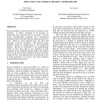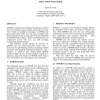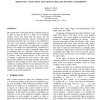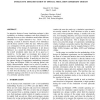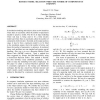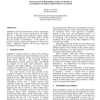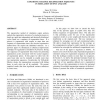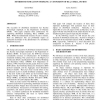98
Voted
WSC
1998
15 years 3 months ago
1998
Process simulation is a powerful analysis tool used in many industries. It allows companies to be proactive in determining what strategies will be successful. For this reason, man...
WSC
1998
15 years 3 months ago
1998
GPSS/H is a well-known, traditional simulation tool whose user base continues to grow despite the presence of many "new" trends in simulation technology. In GPSS/H, the ...
WSC
1998
15 years 3 months ago
1998
We consider how to efficiently allocate computing resources in order to infer the best of a finite set of simulated systems, where best means that the system has the maximal expec...
113
click to vote
WSC
1998
15 years 3 months ago
1998
An attractive feature of many simulation packages is their availability on desktop computers and their potential for allowing the user to run a simulation model under different co...
124
click to vote
WSC
1998
15 years 3 months ago
1998
This paper reports simulation methods and results for analyzing a self-adjusting Quality of Service (QoS) control scheme for multimedia/telecommunication systems based on resource...
125
click to vote
WSC
1998
15 years 3 months ago
1998
In simulation modeling and analysis, there are two situations where there is uncertainty about the number of parameters needed to specify a model. The first is in input modeling w...
102
Voted
WSC
1998
15 years 3 months ago
1998
Simulation models are built with the intent of studying the behavior of the real system represented by the model. However, a simulation model generates random outputs; thus, the d...
106
click to vote
WSC
1998
15 years 3 months ago
1998
The regenerative method of simulation output analysis exploits the regenerative structure of a stochastic process to break up a path into independent and identically distributed c...
WSC
1998
15 years 3 months ago
1998
The execution of distributed simulations has become increasingly important to the Department of Defense (DOD). This paper compares three architectures for supporting distributed c...
WSC
1998
15 years 3 months ago
1998
Causality constraints of random discrete simulation make parallel and distributed processing difficult. Methods of applying reconfigurable logic to implement and accelerate simula...
